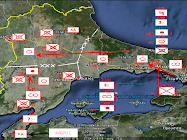skip to main |
skip to sidebar

WASHINGTON (Army News Service, Sept. 9, 2010) -- "It suddenly dawned on me that I had been at the point of impact only minutes before the plane hit the building," said Walter Wood. "I was in shock, bitter with anger that someone had attacked and killed my friends."
Retired Sgt. 1st Class Wood was working for the Army's Office of the Deputy Chief of Staff for Personnel when terrorists flew American Airlines Flight 77 into the Pentagon killing 125 employees on Sept. 11, 2001.
"There's not a day that goes by that I don't think about it," he said.
Wood was watching television coverage of the attacks on the World Trade Center with colleagues, thinking this is what Americans must have felt during Pearl Harbor. Minutes later there was a large explosion.
"We felt the building move, and at that point and time we knew that we had been hit," he said.
Wood and his coworkers evacuated the Pentagon. He tried calling his family, but couldn't get through. He looked up and saw Air Force jets responding to the attack. A Pentagon police officer told Wood to move away from the area because another plane was headed for the building.
It was only later that Wood realized what had actually happened, however, and how close he was to being in the jetliner's path of destruction. Wood had been talking with friends in the Pentagon corridor that was destroyed. Five minutes after he left that corridor, everybody he just talked with was gone forever.
He would never again see Sgt. Maj. Larry Strickland, the senior enlisted advisor to the DCSPER, who was cleaning out his desk, preparing for retirement; or Spc. Chin Sun Pak, who had recently started her stint at the Pentagon; or Max Bielke, a retired master sergeant who had the distinction of being the last official combat Soldier to leave Vietnam.
"Twenty-six coworkers perished that day," Wood said.
Three months later Wood retired from the Army, but the healing process started before then. Immediately after 9/11 the Army provided therapeutic teams to identify stress and depression in employees.
"It was a great effort upon the part of medical command to be able to give us those types of services because it did help us heal," Wood said. "There were people that you could go and talk to at any time. You were encouraged to seek them out, and you were encouraged to speak to them about what you were feeling."
Leadership and resolve from Teri Maude also helped Soldiers and Army civilians stay focused. Maude lost her husband, Lt. Gen. Timothy J. Maude, DCSPER, in the 9/11 attacks, but gathered the strength to talk with displaced Pentagon employees about their duty and thank them for their support.
"I could only imagine the enormous amount of will that it took for her to do this," Wood said.
The healing process continued for Wood after his retirement. He was part of a team that built 125 shadow boxes that would hold American flags, flown over the Pentagon, to be delivered to families. And one year after he left active-duty service, he returned to the Pentagon as a civilian to work in the same area that was devastated on 9/11.
"My wife asked me why I would go back in," Wood said. "The reason I had done it was because if I was so scared as to not go back into that part of the building, then whoever had mounted the terror attacks on the Pentagon would have won."
President Barack Obama is scheduled to speak at the Pentagon Memorial Sept. 11. He will be speaking to the families that lost loved ones during the attack on the Pentagon nine years ago. Wood will be spending the anniversary with his friends and family, thinking about the sacrifices of those that have pledged to defend America.
"9/11 means thinking of those that went before me, for the veterans that have fought in the Global War on Terrorism since that day," Wood said. "It means not giving up, it means being there for Soldiers and families, and everybody that is associated with our efforts as an Army."














































.png)










Δεν υπάρχουν σχόλια:
Δημοσίευση σχολίου